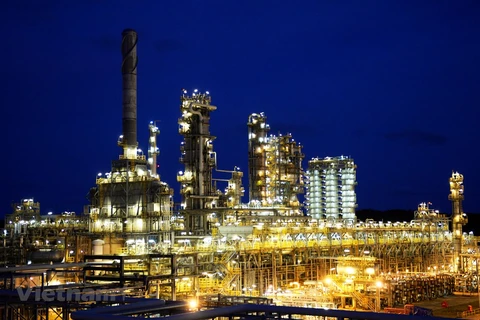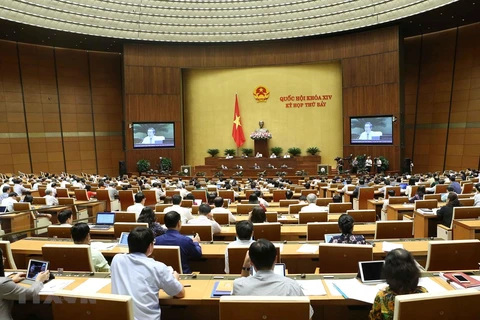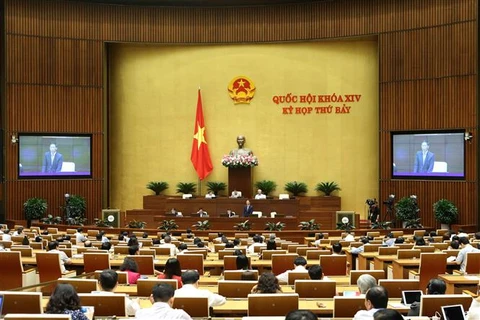Hanoi (VNA) – Reuters and Regnum highlighted Vietnam's economic performance, while Bloomberg said Vietnam has really made a more-than-expected breakthrough and is expected to continue to grow rapidly.
 The processing and motorised vehicle manufacturing industries have contributed greatly to the development index of Vietnam's industry (Photo: VietnamPlus)
The processing and motorised vehicle manufacturing industries have contributed greatly to the development index of Vietnam's industry (Photo: VietnamPlus) The international press last week highlighted Vietnam's economic achievements and forecast that the country’s economy will continue to grow strongly.
Bloomberg noted that Vietnamese Prime Minister Nguyen Xuan Phuc has announced Vietnam's GDP growth target of 6.8 percent in 2020 and its GDP in the third quarter was estimated to increase by 7.31 percent over the same period last year.
Accordingly, Bloomberg said that Vietnam has really made a more-than-expected breakthrough.
Meanwhile, Reuters reported that in the first 10 months of 2019, the disbursed capital of foreign direct investment (FDI) projects in Vietnam was estimated at 16.21 billion USD, up 7.4 percent year-on-year.
According to the UK-headquartered news agency, FDI is an important factor to ensure Vietnam's economic growth as FDI companies create about 70 percent of the country's exports.
Meanwhile, the Regnum news agency of Russia also highlighted Vietnam's economic performance as the country jumped 15 places on the ranking of best economies to invest in, surpassing other Southeast Asian countries such as Malaysia, Singapore and Indonesia.
The national flag carrier Vietnam Airlines was named in the top 10 best airlines in the world in 2019.
Russia’s Virtualnaya Tamozhnya newspaper published an article by Professor Nguyen Canh Toan from the Institute for European Research under the Vietnam Academy of Social Sciences on the occasion of three years since the signing of the Free Trade Agreement (FTA) between Vietnam and Eurasian Economic Union (EAEU).
Professor Nguyen Canh Toan noted the great progress made in economic relations between the partners and proposed measures to improve them.
The professor emphasised the importance of attracting Russian investment in areas such as mineral mining and processing, energy, mechanical engineering and chemical manufacturing, nuclear research centers, e-government projects, information security and smart city projects, among others.
Vietnam also has opportunities to expand investment in processing and light industries as well as in the exploitation of oil and gas fields in EAEU countries, he added.
According to the report delivered at the recent eighth Session of the 14th National Assembly, with the active engagement of the entire Party, people and army, Prime Minister Nguyen Xuan Phuc expected that the country will complete all the socio-economic development targets set for 2019, marking the second consecutive year it achieves and exceeds all 12 key goals.
Economic growth exceeded the set target while the macroeconomic stability was maintained, inflation was controlled and major economic balances were consolidated and expanded. The lives of people in all parts of the country have changed markedly.
The GDP growth rate for the whole year of 2019 is estimated at over 6.8 percent, making Vietnam one of the top high-growth countries in the region and the world.
Along with that, labour productivity increased by 5.9 percent. The contribution of total factor productivity (TFP) reached 42.7 percent. The growth model has shifted positively, reducing reliance on mining and increasing credit.
Deputy Prime Minister Vuong Dinh Hue said that the Organisation for Economic Cooperation and Development (OECD) hailed Vietnam as a country attaining great economic achievements with a strong growth rate and one of the strongest nations in Southeast Asia.
However, Vietnam is also facing a number of challenges. Rapid population aging is putting pressure on the health care and social security systems while climate change is happening faster than expected with the scenario of less rain, rising temperatures and rising sea levels, costing 10 percent of GDP and affecting 10.8 percent of the population...
The Deputy Prime Minister emphasised that, with the orientation of a socialist country, Vietnam will not focus on economic development first to have resources to implement social policies, but in each guideline and policy, the Party and State always associate the implementation of economic development tasks with social security./.






















